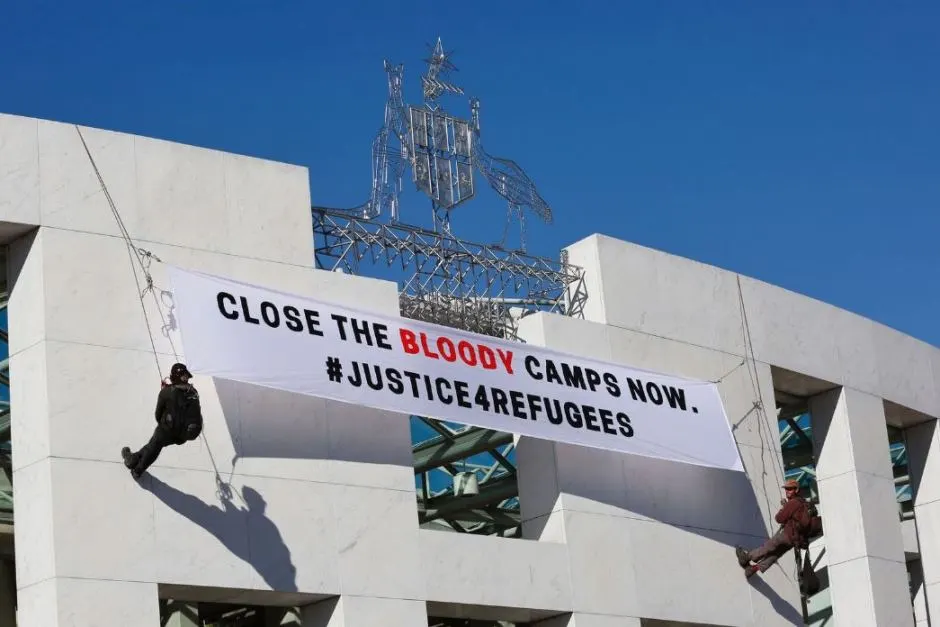Trivia
Crosswords
Sudoku
By John Stapleton
Despite channelling billions of dollars into counter-terrorism and trumpeting national security as a major issue, the past two days have proven that the government is unable to protect even the core of Australian democracy.
A banner proclaiming “CLOSE THE BLOODY CAMPS NOW #JUSTICE4REFUGEES” was draped across the front of Parliament House on Thursday, placed there by two abseiling protesters.
As a man and a woman abseiled down the front of Parliament, demonstrators stood in the decorative pond in front with signs including “stop the boats go die somewhere else”.
It was the final sitting day for Parliament, and an ignominious end to a long and arduous political year.
On Wednesday, about 25 protesters from the group Whistleblowers, Activists and Citizens Alliance interrupted Question Time from the public gallery with loud chants demanding offshore asylum seeker detentions camps be closed. But it was Parliament they succeeded in closing down.
Related Coverage
Great Barrier Reef could end up on UNESCO ‘danger’ list: Qld Government
Parliament House security to be tightened amid terror fears
Their removal was made more difficult by the fact they had glued themselves to the balcony.
The high-profile breaches have raised serious questions about security at Parliament House, with security experts demanding to know how Parliament could be so easily breached.
Head of Homeland Security Asia/Pacific, Roger Henning, described the incidents as a major embarrassment for the Australian Federal Police.
“The latest disruptions, including a forced interval in Question Time, until protesters were evicted, followed by a banner being successfully hung from the top of Parliament House, highlight the lack of security ‘smarts’ and total reliance on CCTV and displays of heavily armed AFP officers, in and around the precinct,” he told The New Daily.
“These are only two components of the security mix needed to protect all who enter Parliament House.
“Politicians and their staffers are not bulletproof and all are living with a false sense of security. It’s just a matter of time before disaster strikes, resulting in mass casualties.”
Dr Tony Zalewski, a forensic security specialist at Global Public Safety who has degrees in law and criminology and is a security risk adviser to governments locally and abroad, told The New Daily that the breaches of parliamentary security were an unfortunate embarrassment for the AFP.

“When you consider what a basic and amateurish group of individuals can achieve in a high-security environment, imagine what professional and properly trained individuals could do,” he said.
“For persons with an ideological or religious motive now have evidence how easy it is to breach the perimeter of one of our most high-profile properties.
“It doesn’t send a good message about strategies, risk minimisation or security effectiveness. I would expect contraband to be identified, things like ropes, hooks, superglue, signage, banners. But none of these seem to have been detected.”
One sympathiser with the protesters, Darrell Morrison, told The New Daily: “So much for Border Force, if we can’t even guard Parliament House. If you can abseil down the front of Parliament House, that is a major breach.”
Controversial measures being considered to increase security around Parliament House include erecting a glass barrier between the chamber and the public gallery and installing 2.6-metre high bollards to block access to the green lawns that surround it.

A spokesman for the Australian Federal Police, Hamish Walker, told The New Daily the AFP worked closely with the Presiding Officers and the Department of Parliamentary Services to ensure the overall security of Parliament House is appropriate.
“Security operations within the parliamentary precinct are constantly monitored to ensure they remain flexible, easily adaptable and are responsive to the threat environment,” Mr Walker said. “Recent events will be considered in an effort to reduce the chances of such events from occurring in the future.”
On his Facebook page, Senator James McGrath of Queensland – who holds the position of Assistant Minister to the Prime Minister – described the demonstrators as “a bunch of bong-sniffing, dole-bludging, moss-munching, glue-guzzling, K-Mart Castros”.
Not everyone agreed.
Refugee advocate Julian Burnside QC told The New Daily: “The parliamentarians are very cross; these people have broken some obscure law.

“But they overlook the larger point, that by conducting operations against boat people, with indefinite criminal detention, that in itself is a criminal offence.
“Parliament should be open to the people, and if the parliamentarians are dedicated to breaking the criminal law, they should face up to the possibility of some members of Parliament protesting about it.”
It is definitely not the end to the parliamentary year Malcolm Turnbull was looking for.
